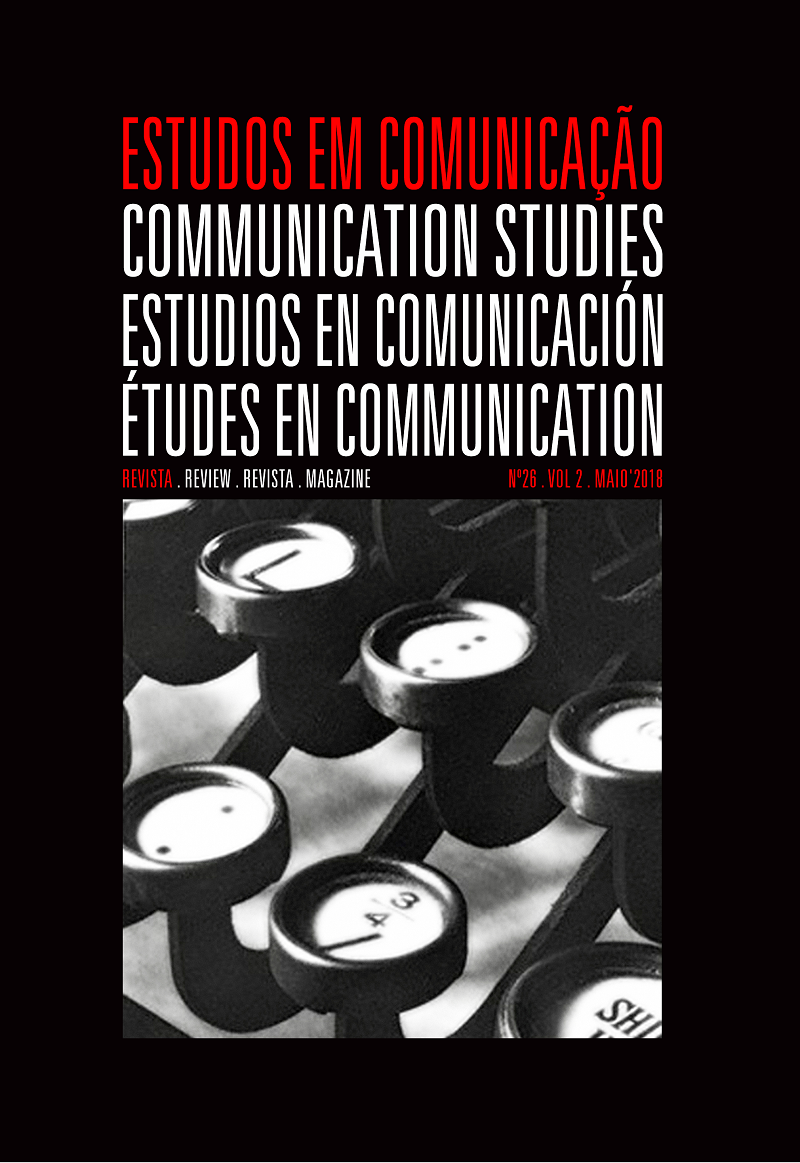A anatomia do escândalo mediático: visibilidade, silêncios e pragmática nos mass media
Keywords:
political scandal, personalization, meaning effects.Abstract
The following essay seeks to analyze the media reconstruction and the social representation of the political scandal as a media event. We will examine aspects of the media communication that convert scandal into a media event, that is, into a selected event, framed and constructed by the media. The first part of this research amount to a theorizing effort about political scandal. The empirical illustration will seek to assess the use of linguistic, rhetorical and significant resources inherent to scandal as a media artifact.
References
Bobbio, N. (1997). O futuro da democracia. Rio de Janeiro: Editora Paz e Terra.
Canel, M. J. & Sanders, K. (2006). Morality tales: political scandals and journalism in Britain and Spain in the 1990s. Broadway: Hampton Pres.
Derrida, J. & Stiegler, B. (1996). Échographies de la télévision. Paris: Galilée.
Entman, R. (2012). Scandal and silence: media responses to social misconduct. Cambridge: Polity Press.
Figueiredo, C. (1996). Grande Dicionário da Língua Portuguesa. Lisboa: Bertrand.
Habermas, J. (2006). Historia y crítica de la opinión pública; la transformación estructural de la vida pública. Barcelona: Gustavo Gili.
Luhmann, N. (2006). Complexidade societal e opinião pública. In N. Luhmann, A improbabilidade da comunicação. Lisboa: Editora Veja, Colecção Passagens.
Markovits, A. & Silverstein, M. (1988). The politics of scandal: power and process in liberal democracies. New York: Holmes & Meier Publishers.
Mesquita, M. (2002). Personagem jornalística: da narratologia à deontologia. In M. Mesquita, O quarto equívoco: o poder dos media na sociedade contemporânea. Coimbra: Minerva Coimbra.
Motta, L. G. (2013). Análise crítica da narrativa. Brasília: Editora UnB.
Nyhan, B. (2014). Scandal potential: how political context and news congestion affect the presi- dent’s vulnerability to media scandal. B.J.Pol.S. 45, 435-466. Cambridge University Press.
Prior, H. (2016). Esfera pública e escândalo político: a face oculta do poder. Porto: Media XXI.
Prior, H. (2018). Escândalo político e narratologia: tecendo os fios narrativos dos casos Face Oculta e Lava Jato. Revista Famecos: Mídia, Cultura e Tecnologia, 25(1), 1-25. Disponível em: http://revistaseletronicas.pucrs.br/ojs/index.php/revistafamecos/article/view/28191.
Ricoeur, P. (1985). Temp et récit III: le temps raconté. Paris: Le Seuil.
Sanchéz, J. (1995). Detrás del escándalo político: opinión pública, diñero y poder em españa del siglo XX. Barcelona: Tusquets Editores.
Thompson, J. (2001). El escándalo político: poder y visibilidade em la era de los medios de comunicación. Barcelona: Paidós.
Todorov, T. (1970). As estruturas narrativas. São Paulo: Editora Perspectiva. Vattimo, G. (1992). A sociedade transparente. Lisboa: Relógio D’Água Editores.
Waisbord, S. R. (2004). Scandals, media, and citizenship in contemporary Argentina. American Behavioral Scientist, 47(8), 1072-1098.
Downloads
Published
Issue
Section
License
Estudos em Comunicação/Communication Studies is an Open Access journal. All its content is freely available without charge to the user or his institution. Users are allowed to read, download, copy, distribute, print, search, or link to the full texts of the articles in this journal without asking prior permission from the publisher or the author. Estudos em Comunicação, by Labcom, is licensed under a Creative Commons Atribuição-NãoComercial-SemDerivações 3.0 Unported License. By submitting your work to Estudos em Comunicação/Communication studies you confirm you are the author and own the copyright, that the content is original and previously unpublished, and that you agree to the licensing terms.


